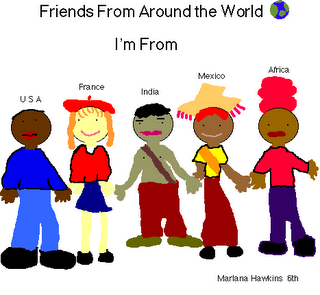BLOGging is collaborative?

Does blogging allow students to enjoy learning and reflecting with others? (Nelson, 2001)
Does blogging give students opportunities to work with other students both in class and over the Internet on collaborative projects and activities? (Nelson, 2001)
“Essentially we are social beings and our brains grow in a social environment. Because we often forge meaning through socializing, the whole role of student-to-student discussion is vastly underused. When used properly, cooperative learning is highly brain compatible. Talking, sharing, and discussing are critical; we are biologically wired for language and communicating with one another” (Jensen, 1998, p.92).
“Social opportunities also affect motivation. Feeling that one is contributing something to others appears to be especially motivating” (National Research Council, 2000, p. 61).
Collaboration affects motivation, feedback, rehearsal, attention….stuff that good learning is made of!!
What blogging articles say about collaboration:
"...[E]dublogs offer students the opportunity to surface their ideas in a social plane. The ability to comment on these ideas enables individuals to participate in social construction of knowledge and meaning making."
-from Huann, T., John, O., & Yuen, J. (2005). Weblogs in education. IT Literature Review. http://edublog.net/astinus/mt/archives/2005/09/weblogs_in_
educ.html. (this link is too long...it was putting my side panel at the bottom of the page)
"...[B]logs become a vehicle through which learners can express their ideas in a state of virtual proximity, creating and refining their ideas through dialogue with other learners and guidance by the teacher."
-from Wang, M., Fix, R. & Bock, L. (2004). Blogs: Useful Tool or Vain Indulgence? E-Learn 2005: World Conference on E-Learning, Oct. 24-28.
"If one thinks of blogs as being essentially on-line journals, it may not be evident how they could be used in collaborative ways.... Writers typically make rich use of hypertext to connect to what others have written on a topic or to resources on the Web. Blog entries are normally followed by a comment button, allowing readers to write a reaction, which is created and managed by individuals, group blogs are also possible."
-from Godwin-Jones, R. (2003). Emerging technologies (Blogs and wikis: Environments for on-line collaboration). Language Learning & Technology, 7(2), p. 12- 16. http://11t.msu.edu/vol7num2/emerging/.
"Blogs provide an immediate audience."
-from Brooks-Young, S. (2005). Writing for an audience: Use blogs to expand your students’ horizons. Today’s Catholic Teacher, 39(2), p. 10f.
Blogs can even be used by parents.
-from Weiler, G. (2003). Using weblogs in the classroom. English Journal, 92(5), p. 73f.
"It is likely that someone outside of a class will happen across student blogs or a classroom collaborative blog. As such, blogging can help extend the classroom from teh physical constraints of those who fit in the room and are registered to a limitless international sutdent body."
-from Trammell, K. & Ferdig, R. (2004). Pedagogical implications of classroom blogging. Exchange Quarterly, 8(4), p. 60f.
"Practical constraints of time and space prevent students from sharing ideas as they occur in classroom discussions. Blogs provide a communication tool in which each student can participate in that learning community, posting, connecting seeing, reading, thinking, and responding in a contagious rhythm that leads to greater participation within the thinking space of the classroom."
-from Kajder, S. & Bull, G. (2004). Scaffolding for struggling students: Reading and writing with blogs. Learning and Leading with Technology, 31(2), p. 32f.
"Writing in blogs can lead to sharing ideas and work within communities, something students appeared hungry for within their posts."
-from Kajder, S. & Bull, G. (2004). A space for “writing without writing”. Learning and Leading with Technology, 31(6), p. 32f.
"The process of reading online, engaging a community, and reflecting it online is a process of bringing life into learning."
- from Downes, S. (2004). Educational Blogging. EDUCAUSE Review, 39(5), p. 14f.
"Weblogs have enormous potential to create learning spaces that are social and student-owned."
-Oravec, J. (2003). Blending by blogging: weblogs in blended learning initiatives. Journal of Educational Media, 28(2/3), p. 225f.
Initial Sources:
Jensen, E. (1998). Teaching with the brain in mind. Alexandria, VA: Association for Supervision and Curriculum Development.
Jensen, E. (2000). Brain-based learning: A reality check. Educational Leadership, 57(7), p. 76f.
National Research Council. (2000). How people learn: Brain, mind, experience, and school (Ex. ed.). Washington, DC: National Academy Press.
Nelson, K. (2001). Teaching in the Cyberage. Thousand Oaks, CA: Corwin Press, Inc..

 .
.

0 Comments:
Post a Comment
<< Home